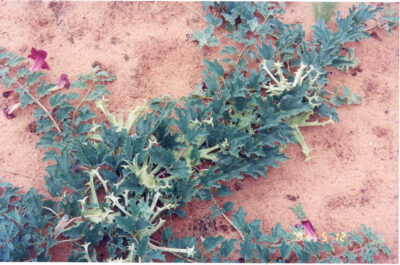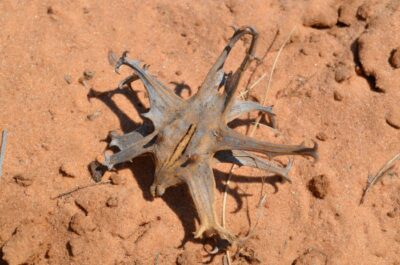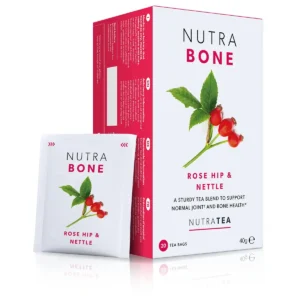Devil’s Claw is Nature’s Painkiller

Devil’s Claw (Harpagophytum procumbens) is a famous herbal painkiller in folk medicine. Don’t be scared by its name, which derives from the hook-like appendages on its fruit. They’re said to resemble claws, but they’re nature’s design to facilitate seed dispersal. Devil’s Claw is anti-inflammatory and it reduces pain throughout the joints and in the lower back. It also supports healthy digestion and liver function. It’s particularly helpful for people with arthritis and lower back injuries. NutraBone is a sturdy tea blend containing Devil’s Claw. NutraBone tea improves joint mobility, promotes overall bone health and the body’s natural flexibility, all while reducing pain and swelling. It’s a valuable natural alternative to nonsteroidal anti-inflammatory drugs (NSAIDs), because it’s just as effective long-term without the risks.
Devil’s Claw contains:
- Iridoid glycosides (Harpagoside, Harpagide, Procumbide, 8-para-coumaroyl-harpagide)
- Phenylpropanoid glycosides like verbascoside
- Phytosterols like β-sitosterol
- Triterpenoids like oleanolic acid and ursolic acid
- Flavonoids like luteolin and kaempferol
Reduces Inflammation
Devil’s Claw reduces inflammation, particularly in people with painful arthritis. Devil’s Claw tea can significantly decrease pain and stiffness in patients with osteoarthritis and rheumatoid arthritis. Its anti-inflammatory effects are very likely due to its iridoid glycoside harpagoside, which inhibits the production of pro-inflammatory cytokines and enzymes such as COX-2. NutraBone tea blend is a potent natural alternative to nonsteroidal anti-inflammatory drugs (NSAIDs), offering pain relief with fewer gastrointestinal side effects.

Reduces Lower Back Pain
In addition to its anti-inflammatory properties, Devil’s Claw can relieve both acute and chronic pain, particularly in the lower back. Devil’s Claw tea can improve mobility and reduce reliance on conventional painkillers. This benefit is particularly valuable for people seeking long-term musculoskeletal support without the long-term risks associated with opioids or synthetic painkillers. Enjoy a cup of NutraBone tea every day and experience relief from painful inflammation. Some people are completely pain free after supplementing with Devil’s Claw for a month.

Supports Digestion
Another amazing benefit of Devil’s Claw is the way it kills pain and also supports digestive health. Most painkillers upset the stomach! Traditional African folk medicine utilizes Devil’s Claw to stimulate appetite and improve digestion, devil’s claw may help reduce symptoms of dyspepsia, such as bloating, gas, and indigestion. Its bitter compounds are thought to stimulate bile production and gastric secretions, aiding the digestive process. The plant can provide relief from mild gastrointestinal inflammation and can promote overall gut health, which wards off other chronic diseases.
Supports Liver Health
Devil’s Claw may also help improve liver function and detoxification. The plant’s antioxidant and anti-inflammatory properties can help protect the liver from damage caused by toxins or chronic inflammation. The traditional use of Devil’s Claw as a general detoxifying agent in African herbal medicine aligns with recent modern research. Because it supports the liver’s ability to process waste and toxins efficiently, Devil’s Claw also helps maintain metabolic health and supports recovery from exposure to toxins.

More About Devil’s Claw
The medicinal part of the plant is its thick, tuberous root, which contains the active compounds primarily responsible for its health benefits, the potent iridoid glycoside harpagoside. Devil’s Claw is a perennial plant native to the arid regions of southern Africa, particularly Namibia, Botswana, and South Africa. The generic name, Harpagophytum, is derived from the Greek words harpago meaning “hook” and phyton meaning “plant”. It’s also called grapple plant and wood spider. Devil’s Claw thrives in sandy soils and harsh climates, growing low to the ground with sprawling stems and vibrant, trumpet-shaped purple flowers. Its Seeds have a high degree of dormancy. They have a low respiration rate and may remain viable in the seed bank for more than 20 years.

